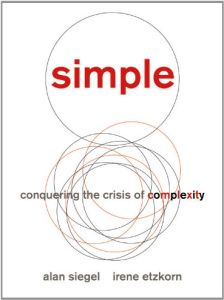Join getAbstract to access the summary!

Join getAbstract to access the summary!
Alan Siegel and Irene Etzkorn
Simple
Conquering the Crisis of Complexity
Twelve, 2013
What's inside?
As life grows increasingly complex, you can make an updated case for KISS – Keep It Simple, Stupid!
Recommendation
Exasperating automated phone systems, impenetrable product packaging, complex appliance instructions, indecipherable contracts and one-sided click-through agreements are only a few examples of the complexity that makes life frustrating and difficult. People find complexity maddening, and it hampers the smooth flow of business and government. Companies that have taken a stance against complexity, such as Apple and Trader Joe’s, have enjoyed unparalleled success. Anticomplexity advocates Alan Siegel and Irene Etzkorn elegantly express the case for simplification. Although readers will nod their heads in agreement with this indictment of complexity, the writers should have followed a bit of their own advice by providing outlines, summaries or bullet points. Nevertheless, getAbstract recommends this manifesto about simplification for a measure of comfort and as a practical, workable vision of a better way.
Summary
About the Authors
Alan Siegel, who ran a simplification project for the IRS, works at Siegelvision where Irene Etzkorn is chief clarity strategist. She writes and speaks on simplification practices.

















Comment on this summary